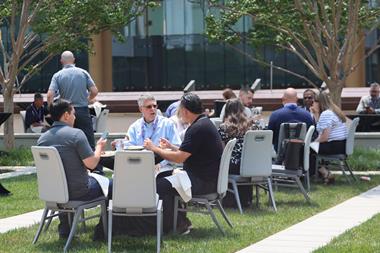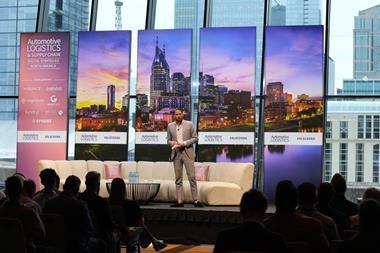TNT is shifting gears to accelerate in the automotive aftermarket and emergency logistics sector, with particular expansion in the booming South American region
Although TNT, which is best known for its €11-billion ($16.5m) revenue mail and express delivery business, sold its logistics division in 2006, the Dutch company maintains a strong focus in the automotive sector with industrial logistics activities in its TNT Express division that differ from TNT Post’s activities.
“Generally in the automotive industry, TNT Express is seen as a courier company, so people are often surprised to see TNT’s auto activities,” says Darryll Cooke, global industry director for automotive accounts, based in Birmingham, UK. Contracts tend to last up to five years in the range of €15m per year.
Another reason for the surprise by some potential customers is that TNT completed the sale of its main logistics arm for proceeds of around €1.3 billion to Apollo Management, a private equity firm in November 2006, creating Ceva Logistics.
A sizeable spare parts and emergency freight business
Despite shedding its logistics arm, TNT retained a broad range of delivery activities in the automotive sector. The company works for most of the major international automotive companies such as General Motors, Volkswagen, Daimler and Volvo.
TNT provides emergency inbound production shipments from suppliers to assembly plants and aftersales parts from distribution centres to dealers. The company also works for component suppliers for emergency and standard inbound production as well as finished and intermediate goods distribution.
 TNT is also targeting agricultural equipment manufacturers to handle emergency and standard inbound production and aftersales parts to dealers.
TNT is also targeting agricultural equipment manufacturers to handle emergency and standard inbound production and aftersales parts to dealers.
In Europe the company secures around 70% of its revenues from aftersales distribution direct to the dealer. The company uses its fleet of vans, trucks and aircraft to collect urgent materials from distribution centres late in the day and then “rushes” them to retailers within the same country or abroad.
For example, TNT collects emergency auto parts such as tiny headlamps or large windscreens from a Scandinavian carmaker’s parts centre in Belgium. TNT then taps its air network to fly the parts to the manufacturer’s dealers in the Nordic region.
Cooke recalls that TNT didn’t originally have a suitable scheduled flight from its main European air hub in Liege, so the company relocated one of its aircraft to nearby Brussels to handle the pickups and guarantee the deliveries before 7am.
In Cooke’s opinion, TNT’s emergency inbound business creates challenges for the express delivery company. Cooke says, firstly, volumes can be much heavier at several metric tonnes compared to lighter courier deliveries. Secondly, parts are often ready at a supplier late in the day and require early morning next-day delivery.
Finally, thanks to the potential disruption to an assembly line from delays, these shipments need additional attention compared with a typical courier shipment.
A key part of TNT’s strategy is to deploy an automotive control centre (ACC) concept. This is the foundation of TNT’s auto operations and provides a single point of contact for customers with people who understand the business. TNT’s ACC monitors the status of shipments on a regular basis as they travel through the network. Any potential problems are flagged in order to avoid nasty surprises, Cooke explains.
Similar to the automotive sector in general, TNT also faced an impact from the global economic crisis at the end of 2008 and at the start of 2009.
While TNT’s aftermarket services faced fewer losses, the company saw a big hit in the delivery of emergency vehicle parts in Europe, as plants shut and the parts weren’t immediately needed. As a result, emergency inbound deliveries were often downgraded from air to cheaper road deliveries.
To highlight the point, Cooke says that TNT moved an average of 20,000kg of emergency production parts per day in Europe before the financial crisis. This then plummeted to less than 1,000kg per day during the darkest days.
Nonetheless, Cooke says that emergency inbound started to recover in October. “We see improvements every day,” he says. Indeed, the scenario is likely to improve as inventories become squeezed and new vehicles are launched.
The executive says that TNT aims to bolster its aftersales activities as well as its night delivery capacity in Europe in the second half of 2009, particularly in the Iberian region and Italy.
Elsewhere, TNT is also expanding outside of its main European market. In India TNT has acquired Speedage, bringing new contracts to transport aftersales parts across the country. TNT has also developed its aftersales supply chain business from European parts centres to those in Russia by both air and road, Cooke says.
In Asia, TNT will keep the brakes on its development of operations in China for the time being. TNT wants to establish its Brazilian business in 2010 and will then focus on China in 2011. “We don’t want to go into China half-cocked,” Cooke says.
Cooke says that the big growth for TNT in automotive is coming from Brazil, Latin America’s largest country. International OEMs from Fiat and Renault to GM and Honda have established manufacturing plants in Brazil to supply the growing domestic market as well as exports. The economy has also emerged relatively unscathed from the global economic crisis and expects gross domestic product growth between 4.5-5% for 2010.
 To bolster its position in Brazil, TNT acquired the Brazilian express market leader Mercúrio in 2007 as a major step into the market. TNT then acquired Expresso Araçatuba Transportes e Logística SA in April to fill white spots in the north such as Belem and Manaus as well as the agricultural centre-west region. Farther south, TNT acquired 100% of LIT Cargo in Chile in February.
To bolster its position in Brazil, TNT acquired the Brazilian express market leader Mercúrio in 2007 as a major step into the market. TNT then acquired Expresso Araçatuba Transportes e Logística SA in April to fill white spots in the north such as Belem and Manaus as well as the agricultural centre-west region. Farther south, TNT acquired 100% of LIT Cargo in Chile in February.
Curtis Watson, TNT’s regional managing director for Latin America, says Mercúrio and Araçatuba provide an existing customer base and a solid track record. This makes it easier to begin operations in the auto sector in these countries. It also gives TNT’s automotive teams access to Mercúrio’s fleet of 1,500 vehicles, and 500 vehicles each at Araçatuba and LIT.
By tapping its recent acquisitions, TNT is already reaping the results. TNT had secured BRL55m ($31.8m) or 11.8% of its total Brazilian revenues from its automotive activities this year up to September.
 Of this total, TNT sees 95% of its revenues from outbound aftermarket parts distribution and 5% from other services such as international road, special services, and spot operations.
Of this total, TNT sees 95% of its revenues from outbound aftermarket parts distribution and 5% from other services such as international road, special services, and spot operations.
TNT recently secured a contract to handle GM’s parts delivery from delicate headlights or windshield or bumpers from the plant to original dealers. Indeed, TNT aims to roll out its automotive control centres as best practice and leverage relationships with carmakers in Europe to deliver in Brazil, Watson said.
Watson says that TNT also plans to advance in neighbouring Argentina. Although TNT uses a local partner here, the Dutch company will look at strengthening its presence in the country in 2010.
Argentina produces large volumes of vehicles in its own right and also trades with Brazil and Chile, so it makes sense for TNT to enter this market, Watson says.
“TNT intends to achieve the objective of filling the white spot in Argentina by the end of 2010. The aim is to be ahead of other M&As in Argentina and to complement Brazil and Chile in cross border, national and international business,” he says.
As a result, Watson explains, “we aim to become the undisputed market leader in all classifications by our Latin- American acquisitions.”





































